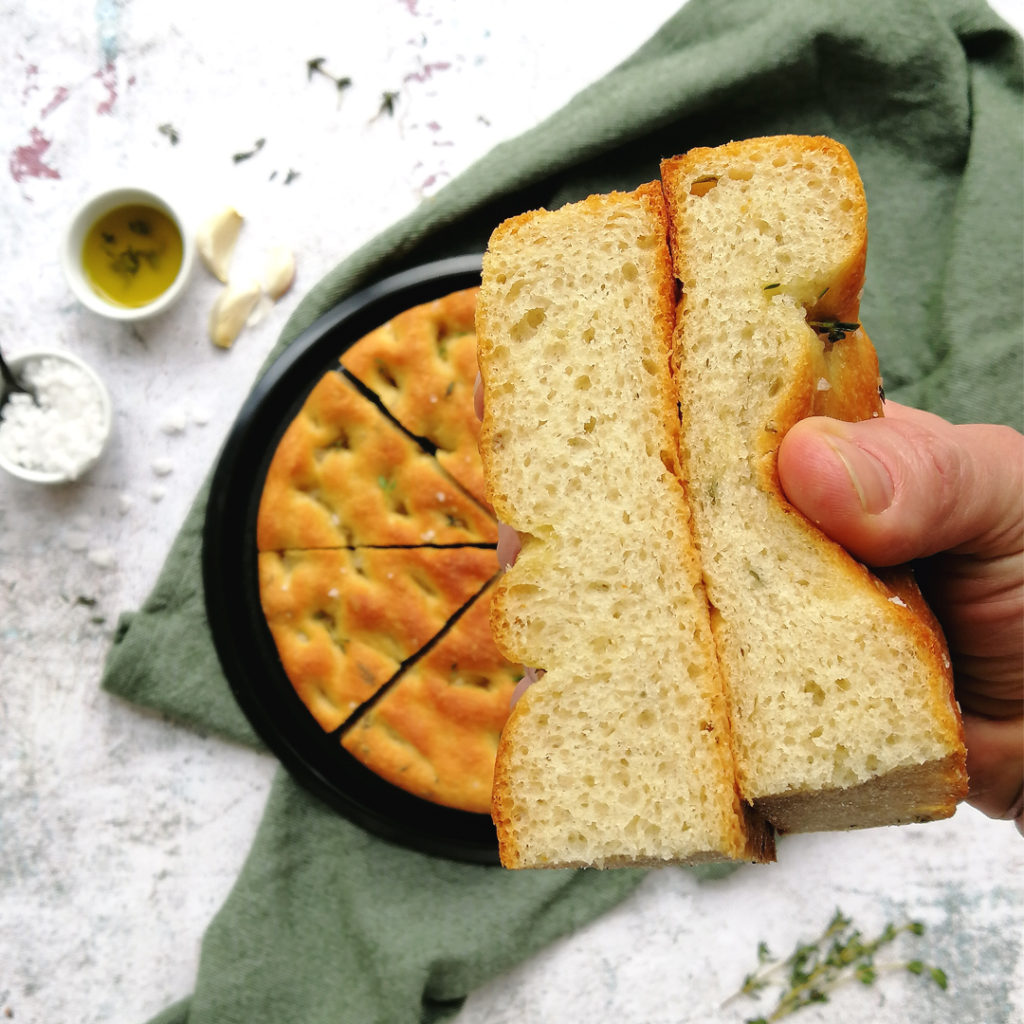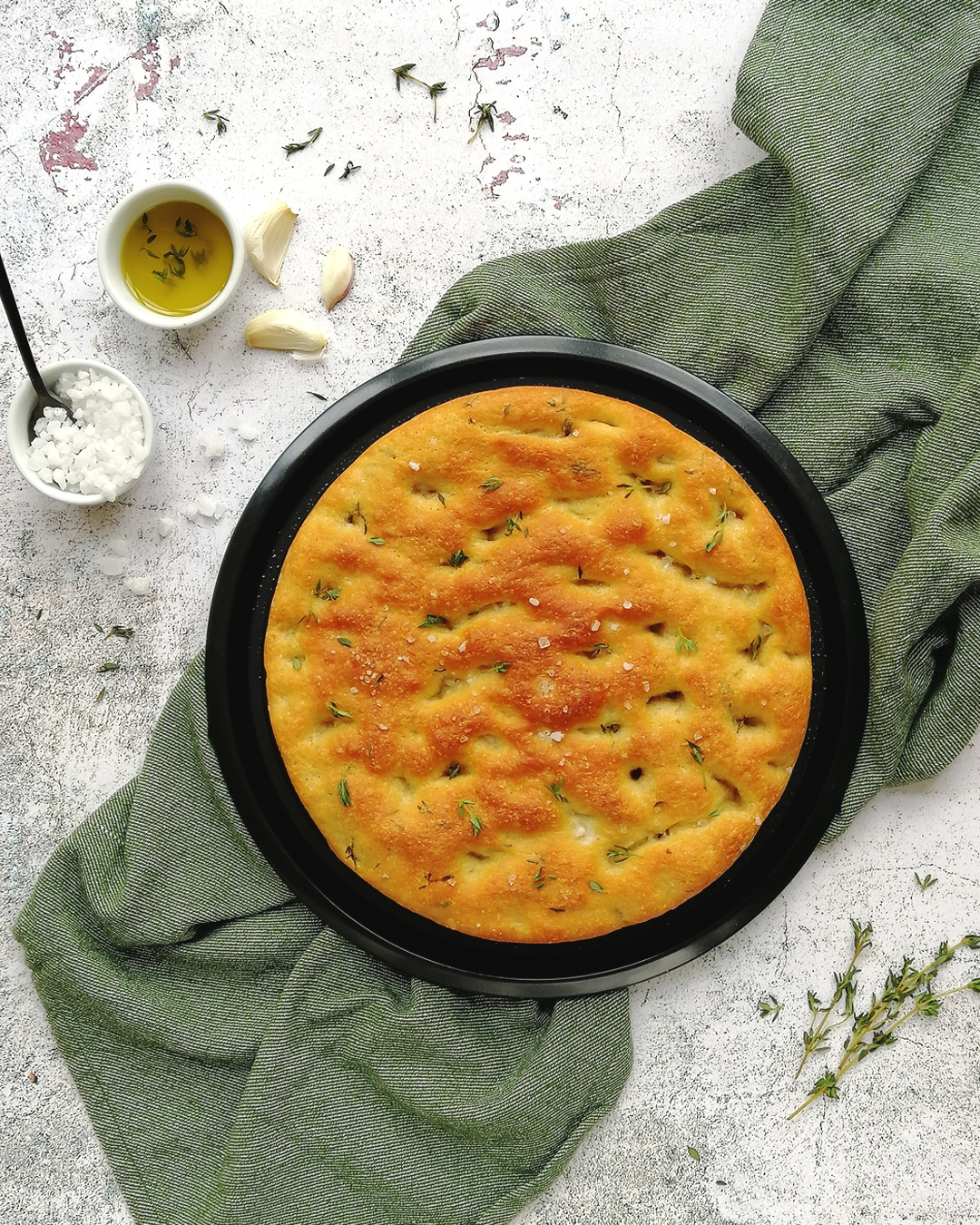In recent years “focaccia” bread has become a worldwide sensation. Alongside ciabatta, it is probably one of the most known Italian breads. It’s said to have originated in the city of Genova, in the Liguria region, where it truly is a staple to eat at any time of the day. Breakfast? Cappuccino and focaccia. Lunch? Focaccia sandwich. Dinner? Salumi and focaccia. Name a pairing, it simply goes well with everything.
Focaccia is a bread unlike no others. First thing first, it’s a local product and it’s available throughout Italy in a huge number of variations and flavours, as it mostly happens with pretty much all Italian dishes. Secondly, but second to none, thanks to its distinctive shape, texture and flavour, anyone who sees it or eats it usually remembers about it forever. Very dramatic and poetic at the same time. The power of focaccia.
To me, focaccia is a versatile crowd-pleaser. It can be eaten on its own, dipped in extra virgin olive oil, sliced and filled as a sandwich with ham or…I still remember the focaccia with tuna, eggs and mayo they used to sell at my high-school café…to die for. But the true secret to a good focaccia is to keep it simple and make it the star of the show.
So here you go. My easy-peasy focaccia has a tight and soft crumb, thanks to the mashed potatoes that are added to the dough itself, and it’s flavoured with a garlic infused oil and fresh thyme, which give it some beautiful aromatic notes. I had to make this recipe and test it a few times to be 100% sure that it worked perfectly (I know, eating focaccia is a tough job, but someone has to do it). I wanted to get the amount of potato exactly right to give it the perfect tender texture, and the right balance of garlic to thyme. For an ‘unforgettable’ focaccia experience. Ok, maybe now it’s too dramatic and too poetic, but it’s just that good.
Note: I suggest that you make a good batch of the garlic oil. You can use any leftover to flavour steaks, pasta or other dishes. Or simply, to dip your focaccia if you’re a fan of garlic.

Makes 1 focaccia (using a 24cm round tin)
Ingredients
FOR THE GARLIC INFUSED OIL
- 75ml extra virgin olive oil
- 2 large garlic cloves
FOR THE FOCACCIA DOUGH
- 250g strong white bread flour
- 110g potato, boiled and peeled (net weight)
- 5g caster sugar (1 tsp)
- 5g sea salt (1 tsp)
- 100ml water, at room temperature
- 3.5g instant yeast (1 tsp)
- 50ml garlic infused oil (see recipe)
- 5g picked thyme leaves (no sprigs)
- 2g coarse sea salt (1/2 tsp) and some sprigs of fresh thyme (to finish)
SPECIAL EQUIPMENT
- food thermometer
- mister or spray bottle
Method
MAKE THE GARLIC INFUSED OIL
- Pour the extra virgin olive oil in a small pan. Bash the garlic cloves, discard the skin, break them in half and add them to the oil. Place the pan on a low heat and gently bring up to 110°C. If you don’t have a thermometer, just keep an eye on the garlic. It should just start to gently sizzle in the oil, but not brown. Keep it going at the same temperature for five minutes, then switch off and leave to infuse, covered for half hour. Leave to cool completely, filter and set aside.
MAKE THE FOCACCIA DOUGH
- Mash the boiled potatoes with a masher or a fork to achieve a smooth consistency, making sure that all small bits are broken down. Sift the flour into a bowl and add the mashed potatoes. Rub the potatoes into the flour with your fingers until they are completely combined into a crumbly mixture. Add the sugar, salt and yeast, rubbing every item into the mixture for a few seconds to evenly distribute it. Add the water and mix with a fork until you get a rough dough and all dry crumbs have been incorporated.
- Turn the dough onto a work surface and knead for about 5 minutes, until you get a fairly smooth consistency. If the dough sticks to your hands, resist the urge to add more flour and just lightly wet your hands instead. After 5 minutes, add 20ml of the garlic oil and knead for another 5 minutes until the oil is completely absorbed and the dough starts to become more extensible.
- Flatten the dough a little, the take the thyme leaves and rub them between your hands to release their oil and enhance their flavour and add them to the dough. Knead for a further 5 minutes until you are left with a smooth and soft dough and all leaves have been incorporated.
- Transfer the dough to a clean and lightly oiled bowl, cover with cling film and a tea towel and leave to rise for 3 hours in a warm place (recommended temperature 28°C).
- Lightly oil the tin you are going to bake your focaccia in (I usually go for a 24cm round cake tin, but you can go for any other shape you like, just remember that this will affect the height of the final focaccia). Uncover your dough and, using a scraper or oiled hands, gently transfer it to the oiled tin. Very gently press the dough to evenly spread it across the tin, making sure not to break the bubbles that have formed inside. Pour the remaining 30ml of garlic infused oil over the dough and, using your fingertips, gently dimple the dough from top to bottom making the typical focaccia holes, distributing the oil evenly.
- Cover with cling film and a tea towel and leave to proof again for 1 hour in a warm place (recommended temperature 28°C). In the meantime, heat the oven to 200°C.
BAKE AND FINISH THE FOCACCIA
- Remove the cling film, spray the dough surface with some water, sprinkle the coarse salt over the top and transfer to the oven. Bake at 200°C for 15 minutes, then lower the oven to 180°C and continue baking for another 20 minutes, until golden, crispy on the top and baked through. Leave to cool in the tin for a few minutes, then transfer to a wire rack to cool completely.
- Finish the focaccia by breaking and distributing some sprigs of fresh thyme all over it, as a decoration. Slice it up and enjoy on its own or with your favourite topping.

